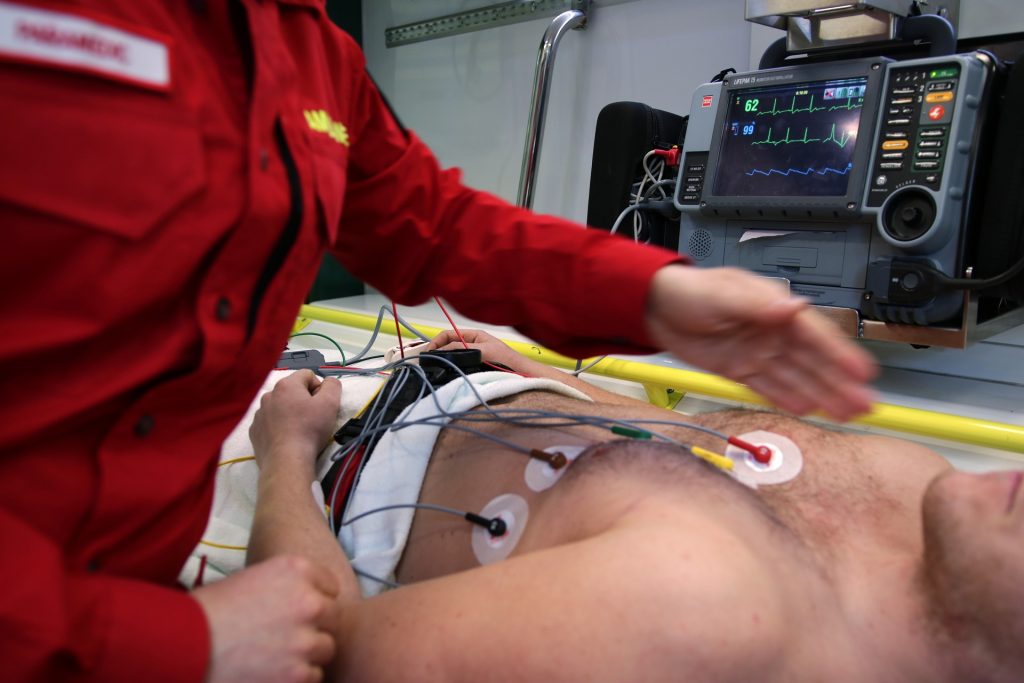
Electrokardiogramm (EKG) Technicians, also known as electrocardiogram (ECG) technicians, are medical professionals who specialize in gathering and using data produced by sensors that use electricity.
The data is used to diagnose medical conditions related to the heart and blood flow throughout the body.
An EKG result can identify when someone has had a recent heart attack, indicate the likelihood of a future heart attack, detect an irregular heartbeat, and more.
For those considering a career change, here are the pros and cons of choosing to become an EKG technician.
Page Navigation
Pros of Being an EKG Technician

To help evaluate the pros of any field as a career choice, the data given by the Bureau of Labor Statistics (BLS) is a vital resource.
All BLS data given here uses information from the year 2020.
EKG technicians are categorized by the BLS under the cardiovascular technologists and technicians set of jobs.
Job Growth and Security
As a medical profession, EKG technicians are in steady demand with an increasing pool of jobs every year.
According to the BLS, the job outlook for 2020-2030 is a growth of 14%, which is nearly double the average rate of 8%.
Individual companies may downsize, but you can expect your EKG certifications to quickly transfer to another job.
Job Choice
EKG technicians are needed in a variety of medical service fields, from general hospitals to specialized outpatient clinics and everything in between.
As soon as you have your EKG technician certification, you have a better ability to pick and choose where you want to work.
In 2020, there were 55,980 people employed as cardiovascular technicians.
The ratio of EKG technicians to the population ranges between 0.22 per 1000 people and 0.64 per 1000 people across the entire United States.
Pay
EKG technicians have a competitive annual wage with room for growth at the upper end.
EKG technicians had a 2020 average annual wage of $60,940 and a median hourly wage of $28.41.
That sits above the $56,310 mean annual wage and $20.17 median hourly wage for all other occupations.
EKG technicians that work in other facilities like physician offices or outpatient care centers have a higher annual mean wage, shooting up to $81,300 for outpatient centers.
For comparison, the median pay was $35,100 for a pharmacy technician and $36,650 for EMTs and paramedics.
Caregiving
For many people, having a job that provides a positive impact is as important as a job that pays well.
An EKG technician can make the difference between life and death.
Every time you perform an EKG, you may be giving the grandkids a few more years with their grandparent.
The result may not be as direct as a surgeon removing a tumor or an EMT supplying CPR, but it is no less important in the medical process.
Mental Engagement
EKG technicians have to focus on a variety of tasks that require attention to detail and hand-eye coordination.
Getting the best result from an EKG requires careful placement of the sensors and adjustment of the machine.
Boredom and monotony can make workday progress at a snail’s pace, so the focus required as an EKG technician will cause the time to fly.
Cons of Being an EKG Technician

Training
Although the training requirements for an EKG technician are light compared to other medical professions, it still requires a minimum understanding of the technology and the science that facilitates the job.
In most cases, EKG technicians will complete a training course or associate’s degree before taking the exam, typically completing the training in about a year.
If you gain experience working as an EKG technician under the direct supervision of a licensed technician, you can put that experience towards the certification.
Certification
You will need to pass a certification exam to become a licensed EKG technician.
While not legally mandated in most locations, insurance companies will likely not pay for EKGs performed by unlicensed practitioners.
That makes hospitals and other medical facilities unlikely to accept unlicensed EKG technicians.
The certification exam has a small cost and takes about two hours to complete, but they are not the most time-consuming parts of the process.
Retraining and Recertification
Medical professions typically require ongoing training and certification to ensure the newest information is in use.
The CET certification for EKG technicians needs to be renewed every 2 years in conjunction with 10 continuing education credits.
Advancement May Require Additional School
Because an EKG technician may not require a degree at all, advancing from the position can be stifled if you don’t pursue additional secondary education while still working as an EKG technician.
Alternative advancement options may present themselves as you gain experience, but the degree is still going to be a major concern if you want to move within the medical field.
Medical Work Environment
Of the nearly 56,000 technicians tracked by the BLS, 43,610 of them are employed at general or surgical hospitals.
A medical work environment does include risks and considerations that are not present in other fields of work, such as a greater exposure risk to contagious diseases and a higher emotional toll with death and injury always nearby.
Patient Interaction
Most EKG technicians will be in direct contact with patients to perform diagnostic tests.
You may have other duties that require patient interaction, such as scheduling appointments or communicating with the patient’s family members.
There are occasions where uncooperative patients who are a danger to themselves or others need an EKG.
If you don’t like dealing with people, being in a position with as much patient-facing time as an EKG technician might present issues.
Even if you are a people person, the toll of dealing with stress and heartache throughout the day can be wearisome.
No Remote Work
An EKG technician is highly unlikely to find a position directly related to their expertise in a work from home (WFH) environment.
With more and more jobs switching to WFH operations to make things easier for employees and remove office costs for employers, this is one of the few serious negatives when comparing your career options.
The ability to find an EKG technician job in nearly any location does help you pick and choose where you want to work, but it’s not quite as broad of a choice as an IT troubleshooter answering the phone from wherever they happen to be.
Fast-paced Work Environments
At a busy hospital or doctor’s office, you may be rapidly cycling from preparing a patient, performing tests, and submitting the results throughout your entire shift.
The cardiologist and other doctors may put pressure on you for faster results to keep patients moving through their appointments.
While this drive is usually rooted in getting better care for the patients, it can be draining for some over a prolonged period.
Physical Requirements
You may have to assist patients with moving into position for the testing procedure.
Sitting is not always an option when you need to move around a patient, so you are likely to spend many hours on your feet throughout the day.
The exact amount of physical activity you have to do will vary based on the setup of your worksite, since larger hospitals may have you running around different wings and floors to perform the next test.
Should You Become an EKG Technician?

As a career, a field is an option that should be considered by those looking for a step up from other jobs that can be achieved with a High School diploma or GED.
Becoming an EKG technician requires a relatively small amount of training for a medical position, but the pay is still competitive with specialties that require much more training.
It’s perfect for anyone looking for a job that pays better than working at fast food while requiring less grueling hours than working for a fulfillment center.
The upcoming job prospects for the future are promising, and it’s an effective springboard into other medical fields.
If you prefer to work remotely and avoid interaction with customers (or patients), then it might not be the job for you.
Similarly, those with weakened immune systems or a fear of medical environments may want to consider other options, but there are EKG tech positions away from the major hospitals and measures that can be taken to reduce the risk of infection.
Those who are put off by a highly stressful work environment will probably want to look elsewhere, too.
Pros and Cons of Being an EKG Technician Summary Table
| Pros of Being an EKG Technician | Cons of Being an EKG Technician |
|---|---|
| Job Growth and Security | Training |
| Job Choice | Certification |
| Pay | Retraining and Recertification |
| Caregiving | Advancement May Require Additional School |
| Mental Engagement | Medical Work Environment |
| Patient Interaction | |
| No Remote Work | |
| Fast-paced Work Environments | |
| Physical Requirements |








